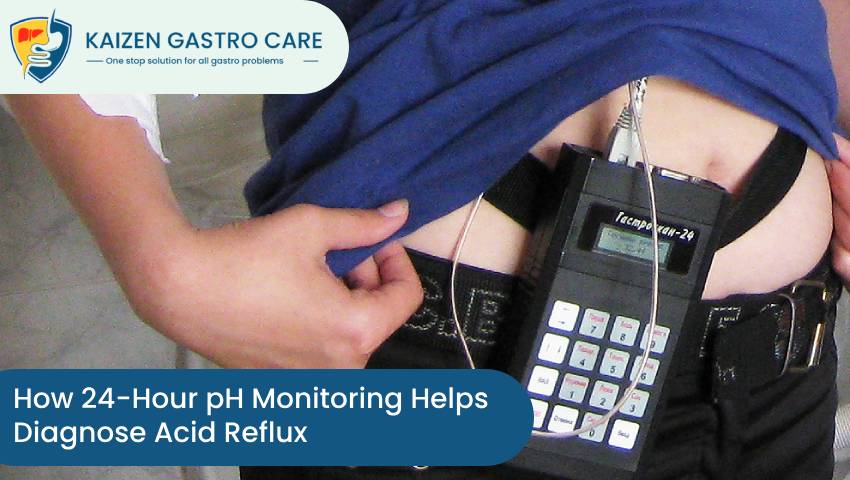
- 22/06/2023
- Kaizen Gastro Care
- 0 Comments
- GI Motility
How 24-Hour pH Monitoring Helps Diagnose Acid Reflux
Acid reflux, also known as gastroesophageal reflux disease (GERD), is a common digestive disorder that affects millions of people worldwide. It occurs when the acid from the stomach flows back up into the esophagus, causing various symptoms such as heartburn, regurgitation, and chest pain. While the diagnosis of acid reflux can often be made based on symptoms and medical history, in some cases diagnosing acid reflux can be challenging due to its intermittent nature. However, advancements in medical technology have led to the development of a valuable diagnostic tool known as 24-hour pH monitoring.
In this blog, Kaizen Gastro Care, the best gastroenterology clinic in Pune, Maharashtra, specialists Dr. Samrat Jankar & Dr. Vikrant Kale will explore how 24-hour pH monitoring helps in diagnosing acid reflux, its benefits, and the process involved.
Understanding Acid Reflux:
The lower esophageal sphincter (LES) is a circular muscle located at the entrance of the stomach, which helps control stomach acid from flowing back into the esophagus. In individuals with acid reflux, the LES weakens or relaxes inappropriately, allowing gut acid to reflux into the esophagus. This can lead to symptoms such as heartburn, regurgitation, chest pain, and difficulty swallowing.
The Need for Accurate Diagnosis:
Since acid reflux symptoms can be similar to those of other gastrointestinal disorders, an accurate diagnosis is essential for effective treatment. Misdiagnosis may result in unnecessary treatments and delays in providing relief to the patients. This is where 24-hour pH monitoring plays a vital role.
What is 24-Hour pH Monitoring?
24-hour pH monitoring is a diagnostic procedure used to measure the amount of acid in the esophagus over a 24-hour period. It provides valuable information about the frequency and severity of acid reflux episodes. The process involves the insertion of a small, flexible tube with a pH sensor through the nose and into the lower part of the esophagus. The tube is connected to a portable recorder that collects data on acid levels.
Significance of 24-Hour pH Monitoring in Diagnosing Acid Reflux:
- Objective measurement: 24-hour pH monitoring provides an objective assessment of acid reflux, unlike relying solely on symptoms and medical history. It helps differentiate acid reflux from other conditions that may simulate its symptoms, such as heart disease or esophageal motility disorders.
- Severity assessment: The procedure helps determine the frequency and duration of acid reflux episodes, allowing healthcare providers to assess the severity of the condition. This information plays a vital role in guiding treatment decisions and monitoring the effectiveness of interventions.
- Treatment optimization: By accurately identifying acid reflux, 24-hour pH monitoring assists healthcare professionals in tailoring treatment plans to each patient’s specific needs. This may include lifestyle changes, medication adjustments, or, in some cases, surgical interventions.
- Uncovering silent reflux: Some individuals experience acid reflux without typical symptoms, a condition known as silent reflux. 24-hour pH monitoring can detect these cases, helping in timely diagnosis and proper management.
The Process of 24-Hour pH Monitoring:
The procedure for 24-hour pH monitoring typically involves the following steps:
- Placement of the pH probe: A healthcare professional will insert a thin, flexible tube through your nose and down into the esophagus. The pH sensor is positioned in the lower part of the esophagus and secured in place.
- Recording device attachment: The other end of the tube is connected to a portable recorder that you will wear during the monitoring period. The recorder collects and stores data from the pH sensor.
- Monitoring period: You will be instructed to go about your regular activities while wearing the recorder. It’s essential to maintain a diary, noting activities, meals, and signs experienced during the monitoring period.
- Data analysis: Once the monitoring period is complete, you will return the recording device to your healthcare provider. The recorded data will be analyzed, and the results will be discussed during a follow-up appointment.
The Benefits of 24-Hour pH Monitoring:
- Objective measurement: Unlike other diagnostic tests, 24-hour pH monitoring provides an objective measurement of acid levels in the esophagus. This helps physicians accurately assess the presence and severity of acid reflux, making it a valuable tool for diagnosis.
- Extended monitoring period: Acid reflux can be intermittent, making it difficult to capture accurate data during a brief hospital visit. With 24-hour pH monitoring, patients can carry on their daily activities while the device records data continuously. This extended monitoring period increases the chances of capturing acid reflux episodes that may otherwise go unnoticed.
- Evaluation of treatment effectiveness: 24-hour pH monitoring is also beneficial in assessing the effectiveness of acid reflux treatments. By comparing pH data before and after treatment, doctors can determine whether the therapy is successfully reducing acid reflux and adjust the treatment plan accordingly.
- Accurate Diagnosis: 24-hour pH monitoring provides a comprehensive review of acid reflux patterns, allowing for a more accurate diagnosis. It helps distinguish between acid reflux and other conditions that may have similar signs, such as chest pain related to heart issues.
- Pre- and Post-Surgical Evaluation: For people considering surgical intervention to manage acid reflux, pH monitoring is a valuable tool for assessing the severity of the condition and determining the appropriateness of surgery. It can also be used post-surgery to assess the success of the process.
Conclusion:
24-hour pH monitoring is a valuable diagnostic tool for accurately assessing acid reflux and guiding treatment decisions. By providing objective data on acid levels in the esophagus over a 24-hour period, this procedure helps confirm the presence of acid reflux, determine its severity, and guide personalized treatment plans.
If you are experiencing symptoms of acid reflux, consult with Kaizen Gastro Care specialists to discuss whether 24-hour pH monitoring is appropriate for your situation. Early diagnosis and intervention can help manage acid reflux effectively, leading to improved quality of life and prevention of complications associated with acid reflux.
